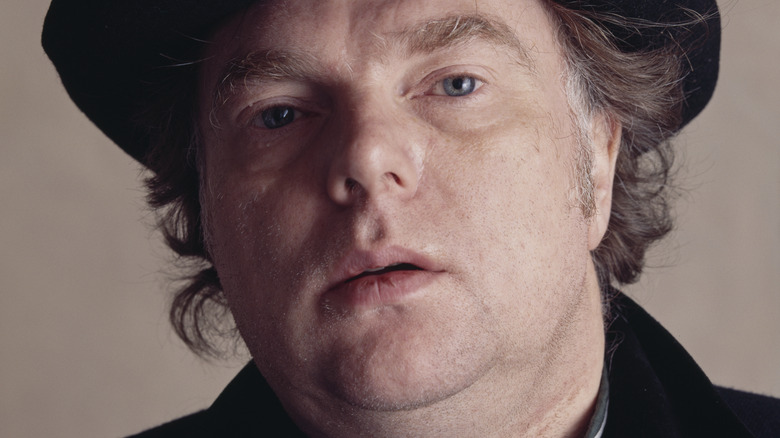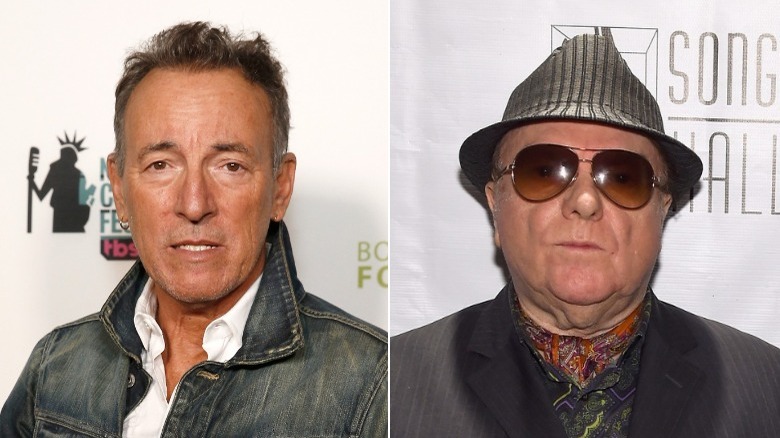Why Van Morrison Has A Problem With Bruce Springsteen
George Ivan Morrison was born in Northern Ireland at the end of WWII in 1945. As a teenager, he first started his career in music playing Celtic-inspired music in his hometown of Belfast. He went on to form the Irish band, Them, which released popular singles like "Gloria" and "Here Comes the Night" in the '60s. He then went solo as Van Morrison in 1967, with his lead single "Brown-Eyed Girl" becoming an all-time classic. The singer followed up the smash hit with his incredible debut album "Astral Weeks." The success continued as Morrison released "Moondance" and other albums, which a 1985 issue of New Age described as a combination of "American R&B and gospel music with rhapsodic references to the English lyric poets and lots of pure Irish soul." This songwriting ability and unprecedented mixture of genres inspired both fans and other musicians, including a young American named Bruce Springsteen.
Springsteen in turn went on to be one of the greatest rock stars of all time. Whether with the E Street Band or performing solo, Springsteen built his legendary career with half a century's worth of music. As of 2021, he had a catalog of 337 songs and 20 Grammy awards, plus an Oscar and a Tony for his theatrical show "Springsteen on Broadway," via Billboard. Legions of fans and accolades aside, one man who might not care about all this success was Morrison, someone Springsteen looked up to.
In this heavyweight songwriter battle, we'll find out why Van Morrison has a problem with Bruce Springsteen.
Van Morrison's scathing critique of Bruce Springsteen
Though Van Morrison admitted that other artists like Ray Charles inspired his own work, "there came a point when I found my own voice," he told New Age magazine in 1985. So, when the interviewer asked Morrison what he thought about people influenced by him, like Bruce Springsteen, the Irish singer had strong words of criticism. Morrison said, "For years people have been saying to me — you know, *nudge, nudge* — have you heard this guy Springsteen? You should really check him out! I just ignored it." But that all changed when a friend introduced Morrison to the American singer. When Morrison first saw a video of Springsteen, he said the performer "definitely ripped me off. There's no doubt about that."
Even more, Morrison felt Springsteen "even ripped my movements off as well. My seventies movements, you know what I mean?" He proceeded to show the interview his on-stage motions to prove that Springsteen's moves weren't original. Morrison explained he liked it better when he had no idea about the other singer. After feeling copied by Springsteen, he said, "I feel pissed off now."
What Bruce Springsteen thinks about Van Morrison
The animosity between the two stars is seemingly only one way, as Springsteen frequently called Morrison as one of his early idols. For example, the singer cited Morrison in his 25 Biggest Heroes list for Rolling Stone. The admiration began when Springsteen first started listening to the Irish crooner's first band, Them, in the '60s. Springsteen even went to one of Morrison's concerts in the early '70s. According to the list, Springsteen found Morrison's "combination of organ and horns intoxicating, and the influence on his first two albums is unmistakable." In fact, a member of Morrison's band ended up helping Springsteen and his band. The American group used Richard Davis, Morrison's bass player, in the recording sessions for the albums "Greetings from Asbury Park, N.J.," and the iconic "Born to Run."
Springsteen named "Madame George" one of his favorite songs ever in the BBC series "Desert Island Discs." Springsteen said the song, part of Morrison's album "Astral Weeks," was a major influence in his own career as a songwriter. "It made me trust in beauty," he said of the album. "It gave me a sense of the divine." The American singer said he loved the record for its spiritual and full of jazz influences. Even more, he called the collection of songs "trance music" for their repetitive chord progression and hypnotic effect.



